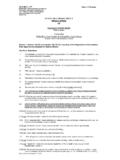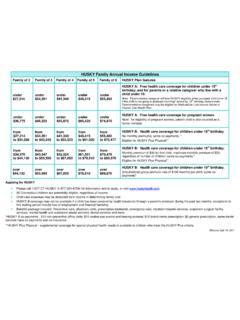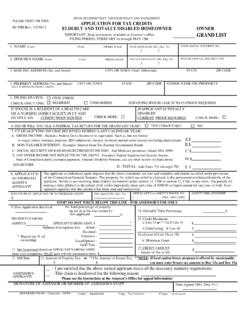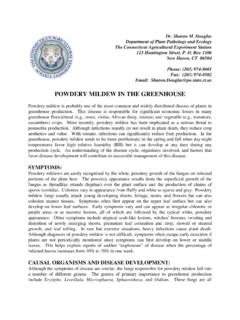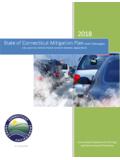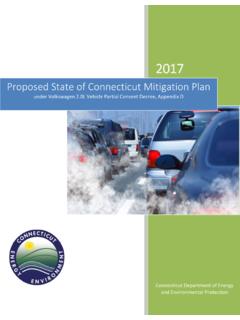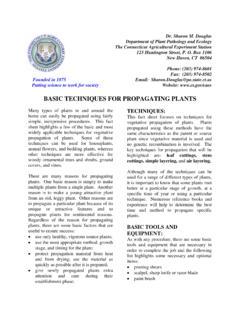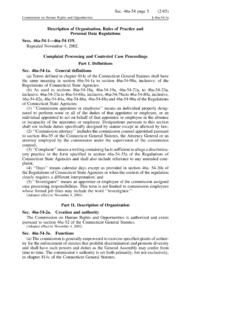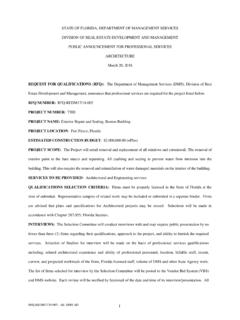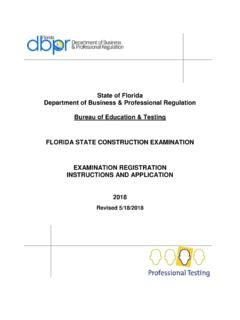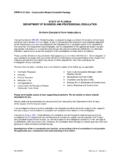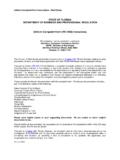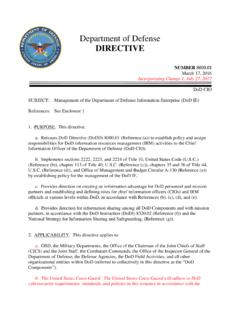Transcription of Connecticut Department of Energy & …
1 Connecticut Department of Energy & Environmental Protection Bureau of Materials management and Compliance Assurance Waste Engineering and Enforcement Division EXECUTIVE SUMMARY Consistent with the Department s guiding principles of transformation and the Bureau s core mission and vision, the Waste Engineering and Enforcement Division (WEED) herein proposes its RCRA Small business Enforcement Policy, the key goals of which are: to increase the return to compliance rate amongst the small business community through an expedited consent order process, to encourage small business growth and sustainability through penalty relief while ensuring consistency with the enforcement program goals and objectives, to improve the predictability, consistency, and uniformity of enforcement, and to improve the timeliness of enforcement actions by reducing both staff time spent negotiating penalties and the referral of cases to the Office of the Attorney General.
2 The proposed policy builds upon the Department s existing enforcement policies and is consistent with the Compliance Assurance Policy (Holbrook, May 23, 1997) and policy memo entitled Enforcement Penalty Calculations in the Face of Challenging Economic Times (McCarthy, March 5, 2009). Through its compliance inspections, WEED has found many small businesses experience difficulty in complying with Connecticut s hazardous waste management laws and regulations. This difficulty, in part, is a result of limited personnel and financial resources. The RCRA Small business Enforcement Policy has been developed to address this issue. The proposed policy maintains the integrity of the Department s existing enforcement policies while concurrently balancing the financial burden imposed on small business to facilitate compliance and business growth. This balance is achieved by allowing for a waiver of the gravity-based portion of the civil penalty while requiring the small business to perform the necessary corrective action within a reasonable and prescribed timeframe.
3 Waiver of the gravity-based penalty is aimed solely at those small businesses who are first-time violators and whose violations are not criminal or willful in nature nor pose a significant threat to the environment and/or human health. WEED expects the policy to be widely applicable amongst the state s RCRA universe. For example, the division s enforcement data estimates that more than half of the formal hazardous waste enforcement actions issued by the Department within the last decade involved respondents who may be considered eligible small businesses under this policy. Given that the average formal hazardous waste enforcement action addresses 10 to 11 violations with a gravity-based penalty of approximately $2,000 to $3,000 assessed per violation; the proposed policy is expected to create a substantial economic relief that can be made available to ensure compliance and reinvestment for the qualifying small business .
4 The RCRA Small business Enforcement Policy, as proposed, will be used on a pilot basis in enforcement of Connecticut s hazardous waste management laws and regulations. The policy may be adapted by other enforcement programs within the Department in the sole discretion of the Commissioner. WEED will track the policy s performance within the division through the following metrics: Time lapse from date of discovery to consent order issuance for cases resolved under the policy versus those cases not resolved under the policy; Percentage of total enforcement cases resolved under the policy; Number and timeliness of cases referred versus not referred to the Office of the Attorney General for litigation; Degree of civil penalty relief provided by the policy. WEED will track such metrics through the Enforcement Action Summary and Formal Action Data Sheet as well as through federal and DEEP enforcement tracking databases already used by the division.
5 The metrics will be tracked by state and federal fiscal year. The intent is that this policy be used as applicable, and solely within the Commissioner s discretion, in settlement negotiations for administrative consent orders. The policy will not preclude other state, local or federal agencies from pursuing penalty based enforcement actions. 79 Elm Street Hartford, CT 06106-5127 Department of Energy and Environmental Protection Bureau of Materials management and Compliance Assurance RCRA Small business Enforcement Policy Effective June 14, 2013 Background Over the years, the Department s Waste Engineering and Enforcement Division (WEED), has found that small businesses in particular have a difficult time complying with Connecticut s hazardous waste management statutes and regulations. In a large part, this is due to the difficulty small businesses have committing limited financial resources and personnel towards environmental compliance.
6 The Department s current enforcement policies, when applied given the degree of non-compliance, have resulted in enforcement actions with civil penalties against these small businesses. A common complaint from the small business community is that the penalties assessed are disproportionately large in comparison to company size and environmental risk associated with the non-compliance, and that much smaller penalties would in fact better meet the Department s enforcement objectives, including the need to maintain a level playing field and deter non-compliance. What are the goals of this policy? This policy is designed to: Reduce, when appropriate, the civil penalty burden on the small business community subject to Connecticut s hazardous waste management statutes and regulations by offering a waiver of the gravity-based component of the civil penalty to businesses that meet certain criteria.
7 Increase the return to compliance rate amongst the small business community subject to Connecticut s hazardous waste management statutes and regulations by offering penalty mitigation to eligible small businesses that promptly return to compliance and agree to enter into a consent order to assess and implement measures to prevent future non-compliance. Reduce enforcement staff time needed to negotiate enforcement actions against small business by refocusing small businesses that meet certain criteria on expeditious correction of violations rather than disputing penalty amounts. Provide transparency and consistency in applying the flexibility allowed by the Department s existing enforcement policies. Department of Energy and Environmental Protection RCRA Small business Enforcement Policy 2 How does this policy define Small business ? For the purpose of this policy, Small business means a business entity, including its affiliates, which is independently owned and operated and employs at the time of the initial compliance inspection fewer than fifty (50) full-time employees.
8 Full-time employee means any employee, including contract employees, logging 2,000 hours or more per year of A small business which is a subsidiary or division of an independently owned and operated parent company may be eligible under the policy if the parent company and all of its subsidiaries and/or divisions as a whole meet this policy s definition of small business . Who is eligible? This policy applies to any small business subject to a civil penalty for violations of Connecticut s hazardous waste management statutes and regulations. It is not intended to be applied to small businesses exhibiting any of the exception criteria outlined below. This is a discretionary policy document. Its applicability to a given circumstance rests with the discretion of the Commissioner or the Commissioner s designee. What are the criteria for penalty mitigation under this policy? To qualify for penalty mitigation under this policy, the eligible small business must: Exhibit good faith efforts to correct the identified violation(s) within the later of ninety (90) days from the date of issuance of the Notice of Violation or one hundred eighty (180) days from the date of discovery of the violation(s).
9 This schedule may be extended up to an additional one hundred eighty (180) days provided the small business provides a written request for extension which is reasonable given the nature of the corrective action(s) to be performed and is approved by the Commissioner. Enter into a consent order with the Department within the timeframe established by the Department s Enforcement Response Policy. The consent order will require the small business to prevent recurrence of the violation(s) by obtaining and documenting on-site compliance assistance from a third-party or government supported program that offers services to small businesses (including, but not limited to, compliance assistance seminars and training offered by the Department , non-profit business consulting organizations, and trade associations) to (1) prepare and submit for the Department s review and approval a plan detailing additional actions and/or operational changes to ensure future compliance with Connecticut s hazardous waste management regulations and recycling laws; and (2) investigate pollution prevention, waste minimization, source reduction and resource conservation opportunities, and to implement such opportunities as 1 Consistent with US EPA s Small business Compliance Policy revised May 11, 2000.
10 2 The small business may request approval from the Commissioner to utilize in-house expertise to come into compliance if an organizational change has resulted in designating such in-house expertise and demonstrating the requisite technical competency to ensure future compliance. Department of Energy and Environmental Protection RCRA Small business Enforcement Policy 3 Meet a first-time violator standard which for the purpose of this policy means: The small business must not have been subject to informal enforcement action by the Department for violation of the identified requirement(s) during the previous five (5) year period or any previous formal enforcement action by the Department for violation of the identified requirement(s). If the small business has been subject to formal enforcement action by the Department for violations of other environmental programs within the previous ten (10) year period, the Department may use its discretion to determine the applicability of this policy.

